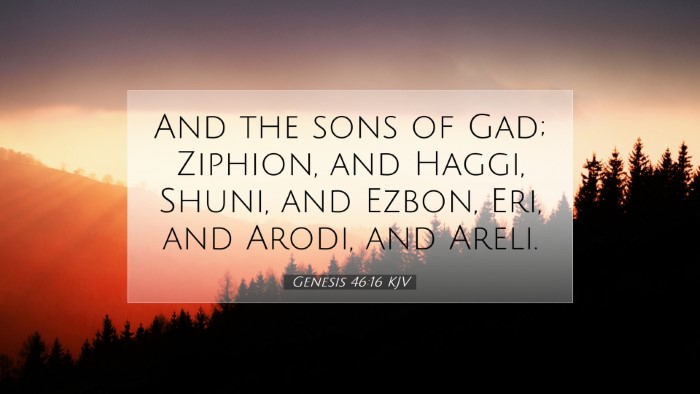Commentary on Genesis 46:16
Genesis 46:16 states: "And the sons of Gad; Ziphion, and Haggi, Shuni, and Ezbon, Eri, and Arodi, and Areli." This verse is part of the genealogy of Jacob as he prepares to migrate to Egypt during a time of famine. The purpose of this listing is to record the descendants of Jacob, specifically focusing on the sons of Gad.
Contextual Background
In the broader context of Genesis, this chapter serves as a pivotal moment in the life of Jacob and his family. God has commanded Jacob to go down to Egypt, providing reassurance of multiplication and blessings despite the foreboding circumstances of their move. This genealogical record emphasizes the significance of familial ties and the covenant promises made by God to Abraham, Isaac, and Jacob.
Commentary Insights
Matthew Henry
Matthew Henry notes that the listing of the sons of Gad contributes to the overall narrative of Israel's development as a people. Each name represents not just individuals but a heritage and identity that will expand and play a crucial role in the history of Israel. Henry points out the importance of remembering our forebears, as their legacy informs our identity and relationship with God.
Albert Barnes
Albert Barnes provides insights into the linguistic and cultural implications of the names mentioned. He highlights that the names of Gad's sons often reflect characteristics or attributes that are salient to the tribe's identity. For instance, the name "Ziphion" may suggest a "sighing" or "breath," implying perhaps an emotive quality associated with the tribe. This analysis emphasizes how names in the biblical text are laden with meaning that transcends mere identification.
Adam Clarke
Adam Clarke elaborates on the significance of Gad as one of the sons of Jacob. He notes that Gad's character is associated with warfare and valor, reflected in the meanings of his descendants' names. Clarke's commentary suggests that understanding these names helps to appreciate the tribal dynamics within Israel's history and their roles during times of conflict and resolution.
Theological Reflections
The genealogies in the Bible serve multiple purposes: they connect the past with the present, provide a frame of reference for God's covenantal promises, and underline the faithfulness of God through generations. In this specific verse, we see God's unfolding plan as encapsulated in the lineage of Jacob's sons. Each son underscores the diverse characteristics and callings of the tribes of Israel, reminding contemporary readers of the multifaceted nature of God's people.
Application for Today's Believers
- Understanding Identity: Just as the genealogical records give identity to the tribes, believers today are reminded of their identity in Christ and the legacy of faith handed down through generations.
- God’s Faithfulness: The mention of specific names reflects God’s unwavering commitment to His promises. This encourages believers to trust in God’s promises in their own lives.
- Importance of Family: The structure of names within a family context teaches the importance of familial bonds and heritage in shaping our spirituality and character.
Conclusion
Genesis 46:16 offers a significant look into the legacy of Jacob's family and God's continuing covenant with His people. The insights from various commentators enhance our understanding by revealing the depth of meaning inherent in the genealogical records. As we reflect on this verse, may we recognize the importance of remembering our spiritual lineage and the call to live out the implications of our identity as God’s chosen people.


